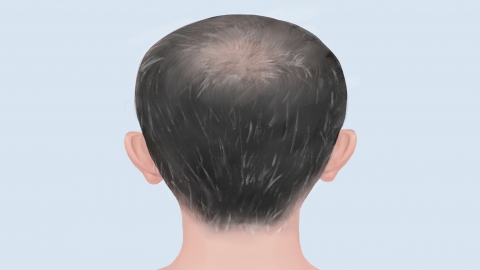What are the reasons for severe hair loss?
Generally, severe hair loss may be caused by genetic factors, unhealthy lifestyle habits, malnutrition, seborrheic dermatitis, alopecia areata, and other reasons. Symptomatic treatments such as general therapy and medication may be needed. If discomfort occurs, it is recommended to seek medical attention promptly and undergo appropriate treatment under a doctor's guidance. Detailed explanations are as follows:

1. Genetic Factors
If there is a family history of hair loss, especially androgenetic alopecia, offspring may inherit this trait, manifesting as thinning hair or localized hair loss. It is recommended to engage in regular physical exercise to promote blood circulation, enhance immunity, and provide a favorable bodily environment for hair growth.
2. Unhealthy Lifestyle Habits
Poor habits such as long-term sleep deprivation, irregular作息 (作息 should be translated contextually, e.g.,作息 time), and smoking may negatively affect hair health and lead to hair loss. These habits may also impact scalp blood circulation and nutrient supply, further aggravating hair loss. It is recommended to improve lifestyle habits, maintain regular作息 time, avoid staying up late and excessive fatigue, quit smoking, limit alcohol consumption, and keep the scalp clean.
3. Malnutrition
Hair is primarily composed of keratin, which requires sufficient protein for synthesis. Nutrients such as iron, zinc, and vitamin D are also important for hair growth and health. Deficiencies in these nutrients can lead to slow hair growth, fragile hair texture, and easy hair loss, which may be accompanied by symptoms like weight loss and dry skin. It is recommended to maintain a balanced diet and ensure adequate intake of protein, iron, zinc, and other nutrients, such as eggs, sesame seeds, etc.
4. Seborrheic Dermatitis
Seborrheic dermatitis may be related to Malassezia infection or long-term alcohol consumption, causing typical red patches on the scalp, accompanied by increased dandruff and hair loss. It is recommended to use medications such as ketoconazole cream, miconazole nitrate cream, and halometasone cream under a doctor's guidance.
5. Alopecia Areata
Alopecia areata is an autoimmune disease in which the immune system mistakenly attacks the body's own hair follicles, causing follicular dysfunction, hair stoppage, and subsequent hair loss. It may be accompanied by scalp itching and pain. It is recommended to use medications such as Yangxue Shengfa Capsules, Minoxidil Gel, and Shenguifas Tang under a doctor's guidance.
Daily recommendations include maintaining good lifestyle habits and mindset, and appropriately massaging the scalp to promote blood circulation, which can help alleviate hair loss symptoms.
References
[1] Huang Jieping, Wang Ying, Cui Yunran, et al. A Case of Congenital Alopecia Areata[J]. Journal of Clinical Dermatology, 2025, 54(02): 113-115.
[2] Hua Ling, Wang Juncheng. The Scalp Is More Fragile and Prone to Aging Than Facial Skin[N]. Science and Technology Daily, 2023-11-01(008).




